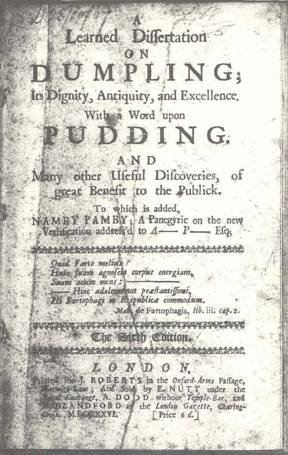
The author, whoever he was, describes his work as “this little Fricassee of Mine” and himself as “a true Dumpling Eater”. The book opens thus:
“The Dumpling-Eaters are a Race sprung partly from the old Epicurean, and partly from the Peripatetic Sect; they were brought first into Britain by Julius Caesar; and finding it a Land of Plenty, they wisely resolved never to go home again.”
And a little later:
“The Dumpling is indeed of more ancient Institution, and of Foreign Origin; but alas, what were those Dumplings ? Nothing but a few Lentils sodden together, moisten’d and cemented with a little seeth’d Fat, not much unlike our Gritt or Oatmeal Pudding; yet were they of such esteem among the ancient Romans, that a Statue was erected to Fulvius Agricola, the first Inventor of these Lentil Dumplings.”
He adds that “the Romans, tho’ our Conquerors, found themselves much out-done in Dumplings by our Fore-fathers”, and is appalled that our historians, “who eat so much Pudding”, have been “so Ungrateful to the first Professors of this most noble Science (ie pudding making) as not to find ’em a Place in History.”
The use of eggs in pudding-making, our author assures us, came about quite by accident in the reign of King John. Some eggs accidentally fell off a shelf into a pudding “which a good Wife was making”, and it was a case of either throw away the pudding or mix in the eggs and eat it. The latter course was adopted to avoid waste, and pudding-making took a giant step forward.
The “good Wife” who made this momentous discovery was sent to court to make puddings for the king himself, and on her demise, her son took over. So good was he at his craft that he became known as Jack Pudding throughout the realm, though his real name was John Brand.
The reader has probably now gathered that this “dissertation” is not entirely serious, and the name John Brand seems to confirm it, for the book is dedicated to a John Brand (or Braund), apparently an MP. Who he was, I have no idea, but I suspect that we today are missing a goodly chunk of some contemporary joke. But to continue….
He made Plain Pudding, Plumb (sic) Pudding, Marrow Pudding, Oatmeal Pudding, Carrot Pudding, Saucesage Pudding, Bread Pudding, Flower Pudding, Suet Pudding, “and in short, every pudding but Quaker Pudding.”
John Brand it was, too, who first thought of Broiling Puddings, and King John was so pleased with this new innovation that he appointed him Knight of the Gridiron. Unfortunately, Sir John, as he then was, soon fell into disfavour on account of the machinations of “some Lubberly Abbots”, and moved to Norfolk, which is why Norfolk is famous for its puddings….
The book lapses into obscurity after this intriguing quasi-historical snippet of information, but by page 19 the fog clears, and our author is waxing lyrical on the subject of puddings:
“What is a Tart, a Pie, or a Pasty, but Meat or Fruit enclos’d in a Wall or Covering of Pudding? What is a Cake, but a Bak’d Pudding; or a Christmas Pie, but a Minc’d-Meat Pudding. As for Cheese-cakes, Custards, Tansies &c, they are manifest Puddings, and all of Sir John’s own Contrivance; Custard being as old if not older than Magna Charta. In short, Pudding is of the greatest Dignity and Antiquity; Bread itself, which is the very Staff of Life, being, properly speaking, a Bak’d Wheat-Pudding.”
The book now becomes a bit deranged, as its author gets carried away. The Bagpipe is a pudding of harmony; a painting a pudding of colours; a poem a pudding of words. Even the head of a man is pudding-like; a Republic is a pudding of people; the Universe a pudding of elements. Cannon balls are military puddings, and bullets but dumplings (“with this difference only, they do not sit so well on the Stomach as a good Marrow-Pudding or Bread-Pudding.”)
Why is the pudding a subject of mockery and prejudice, our author asks? Why is “pudding-head” an insult? Again there is a contemporary allusion here – something to do with a “scandalous libel” entitled The Dumpling Eater’s Downfall. Unfortunately, I am not familiar with this, so the allusion is lost on me, but if any of my readers can enlighten me, I would be most grateful! In the interim, the dissertation closes, on a triumphant pro-pudding note, thus:
“Let not Englishmen therefore be asham’d of the Name of Pudding-Eaters; but on the contrary, let it be their Glory.”
Plots and politics can hurt us, our author goes on, whereas puddings cannot:
“Let us therefore adhere to Pudding, and keep ourselves out of Harm’s Way.”
As for the panegyric NAMBY PAMBY which is tagged onto the end of the Dissertation on Puddings, Lord only knows what that is about!